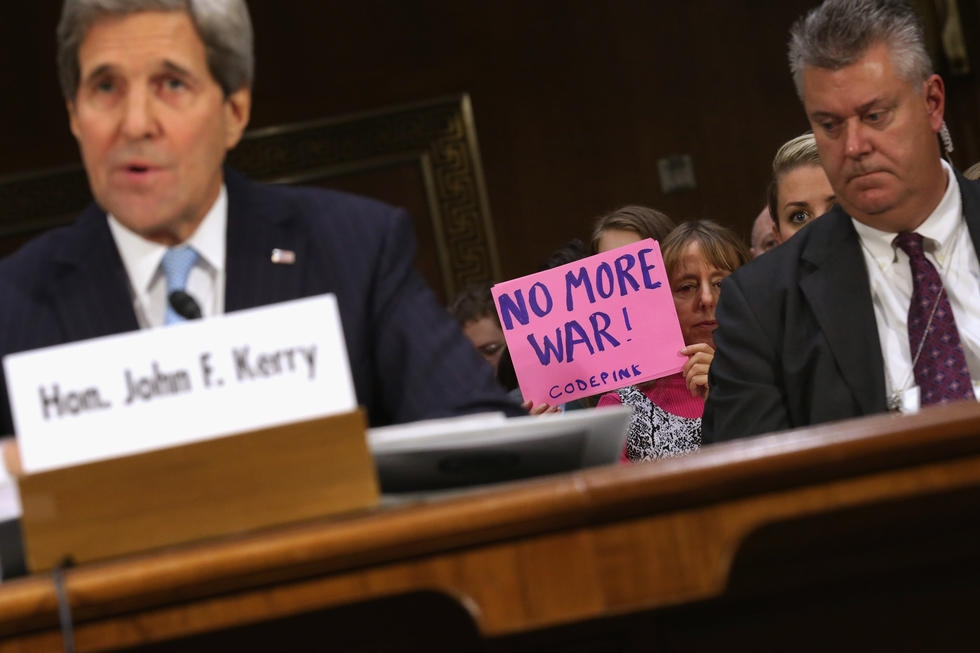The empire’s propagandist

In a recent essay for the influential magazine Foreign Policy, Robert D. Kaplan argues that imperialism is necessary to solve the problems facing North Africa, the Arabian Peninsula, and the Levant. Kaplan is a high profile author and member of the Defence Policy Board, which advises the United States Department of Defence, so what he writes has considerable clout and thus should be taken seriously, yet his analysis is mind-bogglingly bad.
Underlying Kaplan’s article is the racist implication that people in the region are incapable of self-rule and if they are left to their own devices, they will barbarically tear themselves apart. He questions, for example, the “readiness” of the states where the Arab Spring took place “for the rigours of democracy”. Meanwhile, the peoples of the region’s right to independence simply isn’t among Kaplan’s considerations.
His article is based on the absurd premise that imperialism isn’t already a major factor shaping the Middle East and North Africa. For instance, Kaplan mourns “the implosion of Iraq in the wake of the toppling of Saddam Hussein” as though that implosion happened on its own rather than as a direct consequence of the cataclysmic US-led policy of the invasion and occupation of Iraq.
Sounding more like a Republican Party hack than an honest observer, Kaplan criticises Barak Obama for taking a “hands-off” approach to the Middle East and North Africa. But in several cases, the Obama administration’s decidedly hands-on approach has helped enable the chaos that Kaplan laments. He bemoans, for example, the conditions in Libya followed the overthrow of the Gaddafi government though these are the result of the 2011 bombing of the country by the Obama administration and its allies.
The Syrian case is similar. A week before Kaplan’s article appeared, the conservative American group Judicial Watch published previously classified documents from the US Defence Intelligence Agency, which show that in order to weaken the Syrian government the Obama administration either actively supported the creation of an Islamic State in Syria or knew that its allies in Turkey and the Gulf were doing so and did nothing to prevent them. Thus the Obama administration’s approach to Syria has been far from “hands-off.” It most certainly is not geared toward creating the orderly conditions that Kaplan claims he wants to see in the region and one needn’t be enamoured with the Syrian government to see that.
Kaplan makes perfunctory statements of concern for the freedom and security of people in the Middle East and North Africa, but these are unconvincing given that he repeatedly makes clear that his pre-occupation is with what “America requires,” with which countries are “pro-American,” and with removing impediments to “American power projection”. For instance, he argues that the US should “bolster” its already strong support for the military coup regime ruling Egypt because he sees it as beneficial to the US and Israel. Egypt’s mass death sentences, it seems, do not amount to violations of freedom and security in Kaplan’s calculus.
Moreover, much of Kaplan’s piece is spent urging the Obama administration to deepen its support for the Saudi Arabian state so as to weaken its rival in Iran. In this way, the article is a whitewashing of Saudi malfeasance. He describes Iran as both “a great, old-world civilization” and “ruthless and radicalised” whereas his view of the Saudi monarchy is that it “has impressively navigated its way over the decades through immense social transformation at home and a tumultuous security situation abroad”. Despite frequently beheading people, apparently the Saudi government is not ruthless and its long history of allying with the US to spread rightwing jihadism internationally is evidently proof of an impressive foreign policy.
Kaplan suggests that the regional humanitarian situation matters to him. Yet he calls for robust support for a Saudi government that since March has - with crucial US support - led a coalition bombing campaign against Yemen that has had negative humanitarian consequences. In April, the Saudi air force bombed a site in Saada that contained Oxfam’s humanitarian supplies even though the organisation says it provided the coalition with “detailed information” about the location of its facilities.
Moreover, Reuters reports that “Yemen’s dire humanitarian situation . . . has been worsened” by the fighting and by the coalition’s naval blockade. On 8 May, the coalition declared the entire governorate in Saada a military target and in doing so violated international humanitarian law. Doctors Without Borders says that as a consequence of the Saudi-led operation, “all airports in [Yemen] have been destroyed by coalition airstrikes, which could provoke an even greater humanitarian disaster than the one we are already facing”. It cannot be stressed enough that these crimes are examples not only of Saudi atrocities but of US imperialism. Kaplan, meanwhile, expresses his alleged concern for humanitarianism by advocating more power for a US-Saudi alliance that is presently undermining humanitarian conditions.
The examples of Egypt, Iraq, Libya, Syria, Yemen and elsewhere show that Western imperialism is a leading cause of, rather than a solution to, the chaotic violence in the Middle East and North Africa. It’s unlikely that Kaplan sincerely but, as I’ve shown, wrongly believes that the interests of the ruling classes of the US and allied states accord with those of the masses of people living in the region. To convict Kaplan of stupidity but not malice is overly lenient. One doesn’t become a best-selling author and get hired by think tanks and the US Department of Defence by being an idiot. Such luxuries, however, are readily available to those willing to propagandise for the necessarily racist and violently oppressive system that is imperialism.
- Gregory Shupak is an author and activist who teaches media studies at the University of Guelph in Canada.
The views expressed in this article belong to the author and do not necessarily reflect the editorial policy of Middle East Eye.
Photo: An anti-war protestor holds a sign behind Secretary of State John Kerry as he testifies about a congressional Authorisation for the Use of Military Force against the Islamic State 9 Dec, 2014 (AFP)
New MEE newsletter: Jerusalem Dispatch
Sign up to get the latest insights and analysis on Israel-Palestine, alongside Turkey Unpacked and other MEE newsletters
Middle East Eye delivers independent and unrivalled coverage and analysis of the Middle East, North Africa and beyond. To learn more about republishing this content and the associated fees, please fill out this form. More about MEE can be found here.





